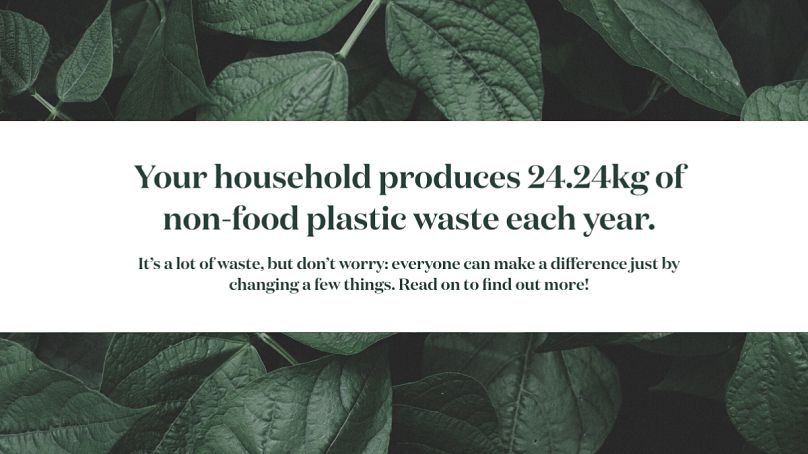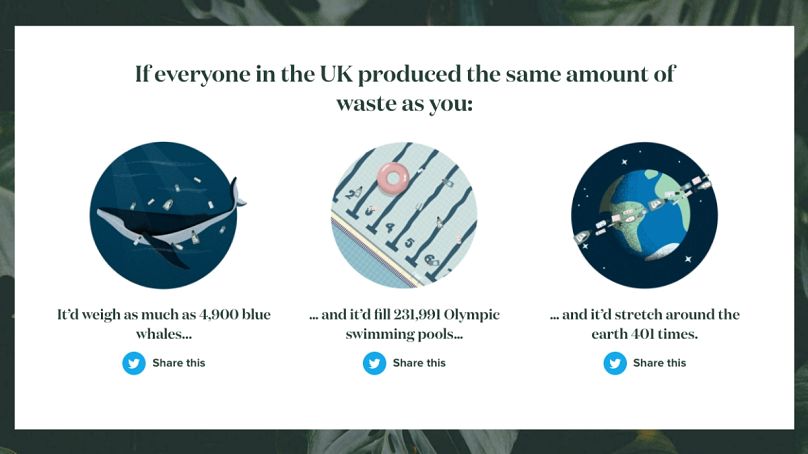Even if you've ditched plastic bottles and straws, you might be surprised to see your full plastic problem.
This month is #PlasticFreeJuly, a global movement which asks us to think about how much plastic waste we’re responsible for. But how can we calculate how much plastic we throw away?
 ADVERTISEMENT
ADVERTISEMENT
 ADVERTISEMENT
ADVERTISEMENT
Millions of endangered marine animals are killed by plastic pollution every year, so the need to solve this problem has never been more urgent. A study by UC Santa Barbara found that less than 10 per cent of all plastic produced has been recycled, resulting in over 8.3 billion tonnes of waste (roughly the size of 50 million blue whales).
Bower Collective, a one-stop online shop for refillable household products, has launched a Plastic Waste Calculator just in time for Plastic Free July. The calculator takes you through the different rooms in your house, tallying up the types of products you use. It then provides an overall picture of your plastic consumption, along with tips to drive that figure down.
“Our intention with this calculator is not to beat people up or make them feel ashamed of their consumption. It is simply to highlight the issue in a relatable way and to set it within the wider national context,” explains Nick Torday, co-founder of Bower Collective.
Putting my (supposedly) green lifestyle to the test
Despite considering myself pretty eco-conscious, I was shocked to see how much plastic waste I generate annually. My penchant for skincare products is taking its toll, with my household producing 24.24kg of non-food plastic waste annually.
It turns out, although I’ve been fastidiously buying products in ‘recyclable’ packaging, most skincare components can’t be recycled because of their size.
If everyone in the UK produced the same amount of plastic waste as me year on year, it would be the same weight as 4,900 blue whales, could fill 232,000 Olympic swimming pools, or circle the earth over 400 times.
Food is the most obvious source of single-use plastic in my life, so I’ve been actively working to avoid this wherever possible. But seeing that there was another 24kg of plastic waste hidden in my household really highlighted the extent of the issue.
The results have been a useful reminder for me to think more carefully about the packaging on everything I buy, and I will be turning to refillable options where possible. It’s important to remember that just because something is theoretically recyclable, that doesn’t guarantee it’s actually going to be recycled.
Pandemic-led plastic waste
The current coronavirus pandemic is also leading to a serious uptick in demand for single-use plastic, as people rely on PPE like masks and gloves to help contain the spread of the virus. A recent survey from City to Sea found that 36 per cent of Brits feel pushed into using more single-use plastic at the moment.
How can we change our plastic footprint?
So what can be done about our ever-growing pile of plastic pollution? One of the first steps is understanding how much plastic we actually use day to day. We may have ditched the plastic water bottles and converted to metal straws, but the full scale of our addiction to the material may not be so clear.
Shops like Bower Collective can help us integrate sustainable behaviours into our everyday lives.
Founded by Nick Torday and Marcus Hill, who have a background in sustainability, Bower allows customers to buy their favourite household and personal care products in refillable glass containers. The company uses a 'closed loop' refill system, sending out refills of products in plastic sachets, which are then returned, sterilised, and reused.
Torday was inspired to start the business after he became aware of his own family’s waste problem. “When we began our own journey as a family to eliminate plastic waste, I realised that the product options available weren't great,” he explains.
“There was a great opportunity to do something better, which is when I called Marcus and we began the journey together that resulted in the creation of Bower Collective.”
Meaningful change requires a ‘holistic approach’
In order to fully tackle the plastic pollution problem, action needs to be taken by governments and corporations, as well as individuals. Paula Devine from the Bedfordshire Chamber of Commerce argues that any approach to eliminating plastic waste “must be holistic” in order to be impactful.
Devine highlights the introduction of the single-use 5p plastic bag tax in the UK as an example of a government-led initiative, which changed the behaviour of individuals for the better. “[The plastic bag tax] has resulted in an 80% reduction in the number of plastic bags purchased - proof that small actions by individuals can make a huge dent in the volume of waste,” says Devine.
Earlier this week, scientists warned that overconsumption is driving the climate crisis, with the wealthiest households responsible for the biggest human impact on the environment. So reducing our individual plastic waste is still a vital step in eliminating global plastic pollution.












